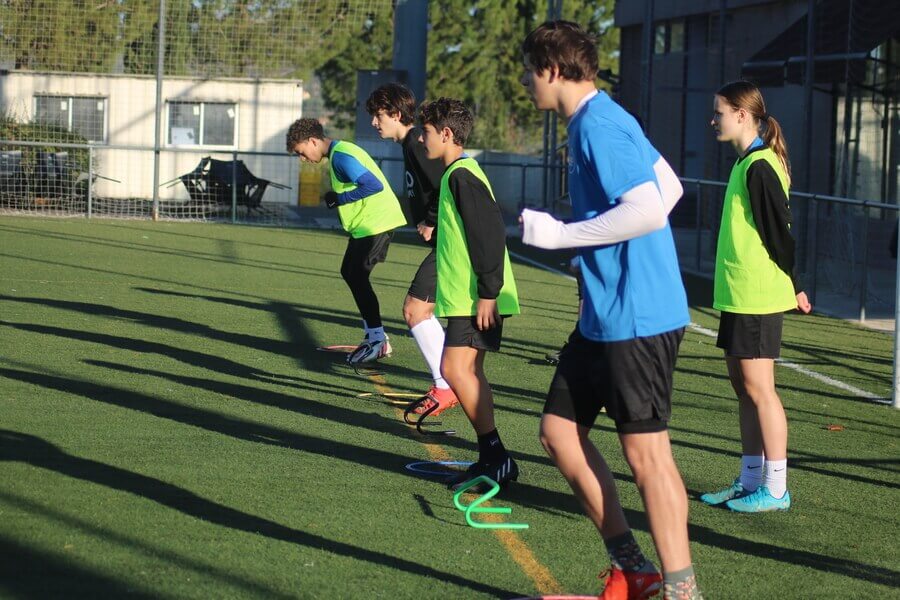Football is a very popular sport played all over the world by both children and adults, competitively or simply for fun. It requires a wide range of physical, technical, tactical and psychological qualities, adjusted to the demands of the sporting engagement. It combines different game situations in which there are rapid accelerations and decelerations, jumps and changes of direction in response to a rapidly changing environment, and in addition, certain technical-tactical skills are required for optimal performance.

We can say that it combines periods of high physical intensity with low intensity, more aerobic periods. So whether you play competitively or just for fun, it helps to keep fit and provides certain health benefits.

Several studies have demonstrated the excellent ability of football to improve physical fitness and health parameters, such as reducing the risk of cardiovascular disease, and improving physiological, psychological and social parameters,

FOOTBALL AND BODY COMPOSITION
Playing football requires a high calorie expenditure, so it can be a good way to improve our body composition, i.e. lose body fat while having fun at the same time. When we play football we use energy aerobically, using fat as our main energy substrate, and anaerobically, using carbohydrates stored in muscle as glycogen as our main energy substrate.

Therefore, a football match requires a large caloric expenditure, and as long as it is accompanied by a good diet we will be in an optimal environment to lose fat and maintain a healthy body weight.

HEALTH BENEFITS OF FOOTBALL
Continuous training and football matches result in a number of very positive health benefits. Studies (1) have shown positive effects on cardiovascular risk factors such as increased maximal oxygen uptake and improved cardiac function in sedentary young men and women. In addition, people who have played football throughout their lives are associated with better left ventricular systolic function, better physical fitness, microvascular function and healthier body composition than healthy adults of the same age, but who have led a sedentary life.

A study conducted at the University of Copenhagen (4), in which they examined long-term musculoskeletal and cardiac adaptations elicited by recreational football, found that long-term recreational football improved muscle function, postural balance and BMD in adult women with a possible favourable influence on the risk of falls and fractures. In addition, football training induced sustained cardiac adaptations, which may have implications for long-term cardiovascular health.

THE PISCOLOGICAL BENEFITS OF FOOTBALL
Football not only brings physiological benefits, but also psychological benefits. As a team sport, it promotes social interaction, communication and bonding between people. It also has the potential to promote long-term adherence to physical activity, even for men and women with no previous experience of the sport. These inexperienced individuals reported a rewarding psychological state and low ratings of worry during the game, considering football training as a fun and rewarding activity in itself (3).

Therefore, we can affirm that football can be a very important alternative treatment based on physical activity for certain conditions or pathologies, with many positive benefits for health and for people who suffer from pathologies such as hypertension, obesity or type II diabetes and who begin to practice this sport with no other objective than to enjoy playing it.

BIBLIOGRAPHY
- Krustrup, P., Randers, M. B., Andersen, L. J., Jackman, S. R., Bangsbo, J., & Hansen, P. R. (2013). Soccer improves fitness and attenuates cardiovascular risk factors in hypertensive men. Medicine & Science in Sports & Exercise, 45(3), 553-560.
- Schmidt, J. F., Andersen, T. R., Andersen, L. J., Randers, M. B., Hornstrup, T., Hansen, P. R., Krustrup, P. (2013). Cardiovascular function is better in veteran football players than age-matched untrained elderly healthy men. Scandinavian Journal of Medicine & Science in Sports, 25(1), 61-69.
- Krustrup, P., Dvorak, J., Junge, A., & Bangsbo, J. (2010). Executive summary: the health and fitness benefits of regular participation in small-sided football games. Scandinavian Journal of Medicine & Science in Sports, 20 Suppl 1, 132-135.
- P Krustrup , P R Hansen, L J Andersen, M D Jakobsen, E Sundstrup, M B Randers, L Christiansen, E W Helge, M T Pedersen, P Søgaard, A Junge, J Dvorak, P Aagaard, J Bangsbo. (2010). Long-term musculoskeletal and cardiac health effects of recreational football and running for premenopausal women. Scandinavian Journal of Medicine & Science in Sports, 20 Suppl 1,58-71.






